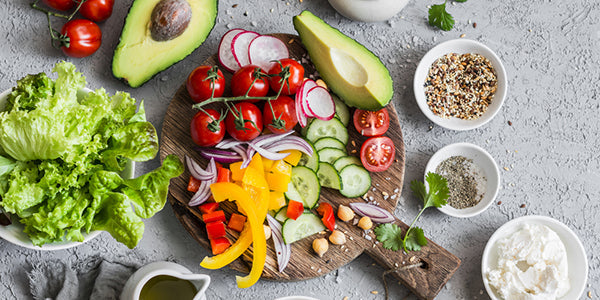
Unlike type 1 diabetes, in which the body's own immune system destroys the cells that produce insulin, type 2 diabetes can be prevented or delayed with a healthy lifestyle, including with a nutritious diet.
What to Eat to Prevent Diabetes
Diet recommendations and foods to prevent diabetes mostly boil down to the following:
1. Increasing Whole Grains
Compared to refined and processed flours and the foods they produce, whole grains and their associated products supply more wholesome vitamins, minerals, and fiber. In fact, evidence supports insoluble fibers found in whole grain products are effective in the prevention of type 2 diabetes. Fiber can also assist in weight loss and maintenance, as individuals who consume a high-fiber diet are shown to maintain a healthier weight compared to those who fall shy of the daily recommended intake of 38 grams and 25 grams for men and women, respectively. Increase whole grain servings in your day by swapping out sugary cereals with oats, choosing whole grain pastas and breads, and offering a serving at each meal.
2. Reducing Added Sugars
Limiting added sugars is a helpful step to reduce diabetes risk, as too much simply supplies nothing more than calories and increases the risk of weight gain. The American Heart Association (AHA) recommends no more than 38 and 25 grams of sugar per day for men and women, respectively. Reduce added sugars in your diet by limiting sugary beverages and snacks, along with recognizing how food companies may be hiding sugar.
3. Eating More Plants
Along with consuming grains, increase the consumption of veggies, fruits, and legumes. They are naturally rich in fiber, all while being nutritionally dense and having the ability to keep calories in check. Increase the consumption of plants by aiming for at least one serving of a fruit or vegetable serving at each meal and snack, along with incorporating more legumes into plant-based dishes.
4. Going for Lean Meats
Protein is essential for preserving and producing lean body mass. Limit the intake bacon, ham, and other processed meats by swapping them with leaner cuts, including chicken, turkey, and fish.
5. Adding Healthy Fats
Adding healthy fats in the diet has shown to prevent diabetes, lower blood sugars, and improve insulin sensitivity. Monounsaturated (MUFA) and polyunsaturated (PUFA) are notorious healthy fat sources and are found in cold-water fish (think salmon, trout, and tuna), olive and canola oils, nuts, and seeds.
Additional Diet Recommendations
Along with foods themselves, the following eating tips can assist in weight loss and reduce diabetes risk:
6. Paying Attention to Portion Sizes
As a general rule of thumb, fill half of your plate with fruits and vegetables; a quarter with a lean or plant-based protein, such as chicken, turkey, and beans; and a quarter with a whole grain, such as brown rice or whole-wheat pasta.
7. Eating Smaller, More Frequent Meals
Doing so can help keep hunger levels at bay and lessen the risk of overeating at mealtimes. Starting your morning with a nutritious breakfast can also encourage healthier choices throughout the day.
8. Enjoying Meals Slowly
Did you know it takes 20 minutes for your stomach and brain to connect the "I'm full" feeling? Slow down and enjoy the meals at hand by sitting down at the dinner table, placing the fork down between each bite, and sipping in water throughout the meal.
9. Considering Drinks
Watch out for sugary and alcoholic beverages, as they tend to contribute nothing more than calories. Swapping out juices, soda, etc. with soda is a simple and recommended way to not only reduce sugar intake, but to keep hydrated.
10. Dining Out Sensibly
Though you can still go out to eat with friends and family, it is important to do so sensibly. Try planning ahead and having a game plan before going, aiming for healthier options and choosing foods that are baked, steamed, grilled, and broiled rather than friend. Splitting the meal with someone else at the table or taking the other half to go can also limit the risk of overeating.







